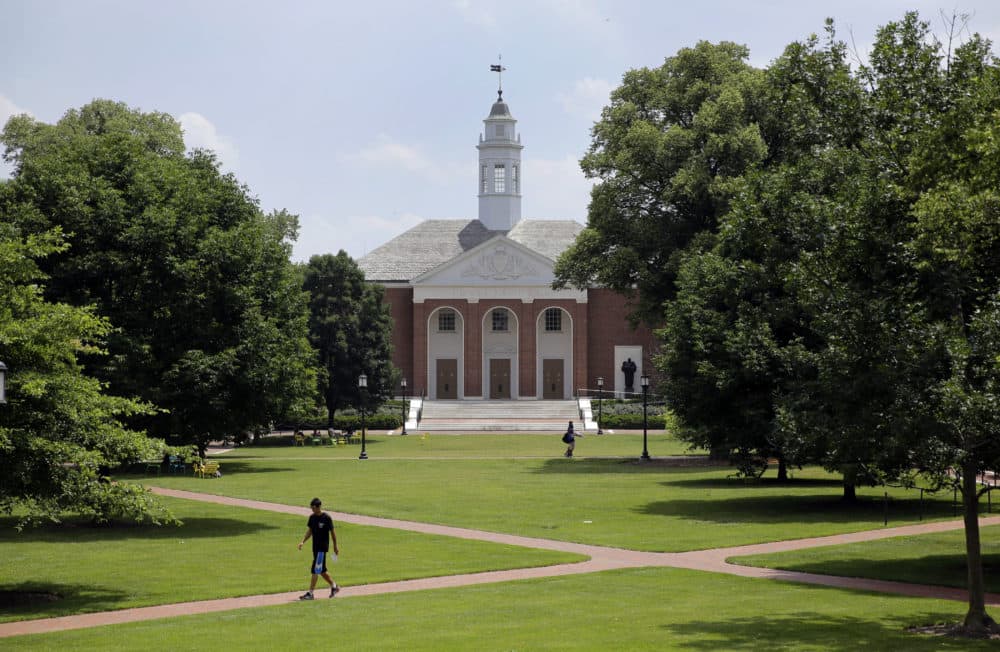Advertisement
'Checked The "Black" Box': On Point Caller On Race-Conscious College Admissions

Harvard University is currently fighting allegations in Massachusetts federal court that the school discriminates against Asian-American applicants.
While some, like our guest Peter Wood, President of the National Association of Scholars, say the case is narrowly focused on a "particular legal issue" — fair treatment for Asian-Americans — others see this case as a test for the greater institution of Affirmative Action.
The Students for Fair Admissions, Inc. (SFFA) v. Harvard case is not the first to take on questions of preference in higher education admissions. As NPR reports, Regents of the University of California v. Bakke and Fisher v. University of Texas, among others, have upheld school-specific Affirmative Action practices as lawful.
During our show on the Harvard trial, Samantha, from La Crosse, Wisconsin, called in to offer her daughter's recent experience as a case for colleges admitting "the best of the best."
"Last year, when my daughter was a senior, she applied to Johns Hopkins," Samantha told On Point. "We are white. She was not accepted. Out of curiosity, we did something not exactly ethical, but out of curiosity she re-applied just switching her middle name and her first name around. Birth date, grade point average, test scores, extracurriculars — everything was identical. That was the only change — in addition to checking the 'black' box on the application.
"Not only was she accepted into Johns Hopkins, she was also accepted into the Peabody program and offered a scholarship covering half her tuition. Just checked the black box."
As mentioned, however, there is legal precedent for this type of admissions decision.
Looking back at the 1978 ruling in Regents of the University of California v. Bakke case, Justice Lewis F. Powell Jr. wrote "in choosing among thousands of applicants who are not only admissible academically but have other strong qualities, the committee" — in this case Harvard's admissions committee — ''can use a number of criteria in mind."
Justice Powell goes on to write, "the race of an applicant may tip the balance in their favor, just as geographic origin or a life spent on the farm may tip the balance. A farm boy from Idaho can bring something to Harvard College that a Bostonian cannot offer. Similarly, a black student can usually bring something that a white person cannot offer."
Advertisement
"She re-applied just switching her middle name and her first name around. Birth date, grade point average, test scores, extracurriculars — everything was identical. That was the only change — in addition to checking the 'black' box on the application."
On Point caller Samantha
Additionally, current Harvard President Larry Bacow, in a conversation with On Point host Meghna Chakrabarti, said those at his school, "seek students who come from broad socio-economic backgrounds. We seek students who are geographically diverse. We seek students who are ethnically diverse. Having all sorts of students come together in a learning environment is the function of our admissions process."
Samantha — whose daughter is currently attending the Massachusetts Institute of Technology — rejects the idea that diversity has to be a factor in admissions.
"I don't even know how to respond," she said. "We also live on a farm, so to hear that farm people have extra preference, it didn't make any difference. We were so baffled, and we wanted to tell our friends, but of course we didn't, because what we did wasn't exactly right.
"She did write a letter, and declined, and said she chose a different school so the scholarship could go to someone else. It wasn't like she tied up a scholarship. But, everything was identical. And if you're going to let in one person who has exactly the same grade point average, exactly the same classes, then you need to let in someone out who is exactly the same. Because that's really what — the best of the best are who should be going to college. Not the best of what they want their yearbook picture to look like."
Essentially, Samantha wants matching spots for equally qualified candidates.
"The best of the best are supposed to go, that's how it used to be," Samantha said.
